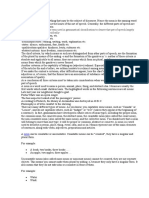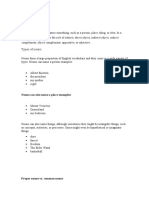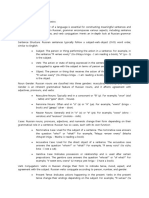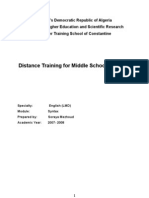0 ratings0% found this document useful (0 votes)
115 viewsCases in Russian: Six Nominative Case
Cases in Russian: Six Nominative Case
Uploaded by
john johnsonThe document discusses the six cases used in Russian nouns: Nominative, Genitive, Dative, Accusative, Instrumental, and Prepositional. Each case is used to indicate a specific grammatical relationship, such as the subject, possession, beneficiary, direct object, means or accompaniment, and location or topic respectively. Examples are provided to illustrate the usage of each case.
Copyright:
© All Rights Reserved
Available Formats
Download as PDF, TXT or read online from Scribd
Cases in Russian: Six Nominative Case
Cases in Russian: Six Nominative Case
Uploaded by
john johnson0 ratings0% found this document useful (0 votes)
115 views5 pagesThe document discusses the six cases used in Russian nouns: Nominative, Genitive, Dative, Accusative, Instrumental, and Prepositional. Each case is used to indicate a specific grammatical relationship, such as the subject, possession, beneficiary, direct object, means or accompaniment, and location or topic respectively. Examples are provided to illustrate the usage of each case.
Original Title
SH1locJ7Tje9ZaHCez43lw 7e927d03325a4d0f81140400b90099c6 Cases in Russian
Copyright
© © All Rights Reserved
Available Formats
PDF, TXT or read online from Scribd
Share this document
Did you find this document useful?
Is this content inappropriate?
The document discusses the six cases used in Russian nouns: Nominative, Genitive, Dative, Accusative, Instrumental, and Prepositional. Each case is used to indicate a specific grammatical relationship, such as the subject, possession, beneficiary, direct object, means or accompaniment, and location or topic respectively. Examples are provided to illustrate the usage of each case.
Copyright:
© All Rights Reserved
Available Formats
Download as PDF, TXT or read online from Scribd
Download as pdf or txt
0 ratings0% found this document useful (0 votes)
115 views5 pagesCases in Russian: Six Nominative Case
Cases in Russian: Six Nominative Case
Uploaded by
john johnsonThe document discusses the six cases used in Russian nouns: Nominative, Genitive, Dative, Accusative, Instrumental, and Prepositional. Each case is used to indicate a specific grammatical relationship, such as the subject, possession, beneficiary, direct object, means or accompaniment, and location or topic respectively. Examples are provided to illustrate the usage of each case.
Copyright:
© All Rights Reserved
Available Formats
Download as PDF, TXT or read online from Scribd
Download as pdf or txt
You are on page 1of 5
Cases in Russian
The nouns in Russian language can be
used in six cases.
1. Nominative case is used when the noun denotes the
subject of an action or state.
Антон пишет письмо. Anton is writing a letter.
It can be introduced by the demonstrative pronouns
«это» or «вот».
Это книга. This is a book.
Вот Анна. Here is Anna.
It can be used in possessive constructions «у [кого?
чего?] есть [кто? что?]».
У меня есть кот. I have a cat.
Cases in Russian
2. The Genitive is used to denote possession, the
relation of the part to the whole, the agent of
an action or process, descriptive attributes etc.
У Кати есть ручка. Katya has a pen.
окна дома
the windows of the house
день свадьбы the wedding day
The Genitive case of nous is also used when
indicating the quantity.
двадцать лет twenty years
тридцать рублей
thirty rubles
три книги three books
Cases in Russian
3. The Dative usually denotes the person for whom
the action is performed (recipient, beneficiary).
Я купила маме подарок. I bought my mom a gift.
It is also used in impersonal constructions denoting
the subject`s feelings or condition.
Детям весело.
The kids are having fun.
Олегу трудно. Oleg finds it difficult.
Cases in Russian
4. The Accusative is primarily used to denote the
object of a transitive verb.
Антон пишет письмо. Anton is writing a letter.
Мы слушаем музыку. We are listening to
music
5. The Instrumental denotes the instrument of
action (the object which is used to perform an
action), participation or involvement (using the
preposition с), and denotes the occupation when
used with the verbs быть, стать, работать.
Я пишу карандашом. I am writing with a pencil.
Я разговариваю с другом. I am talking to a friend.
Я работаю инженером. I am working as an
engineer.
Cases in Russian
6. Nouns in the Prepositional, as the name implies,
are used with various prepositions, i.e. indicating
the location with the prepositions В or НА, or
designating the person or object being thought or
talked about with the preposition О.
Кот сидит на столе.
The cat is sitting on the
table.
Мы живём в этом We are living in this house.
доме.
Одежда висит в шкафу. The clothes are hung in the
wardrobe.
Друзья рассказали мне Friends told me about the
о новой книге. new book.
You might also like
- Woodside Waltz - Julian LageDocument3 pagesWoodside Waltz - Julian Lagejohn johnson80% (5)
- 6.1 Grade 6 Language Handout Term 1 2023-2024Document45 pages6.1 Grade 6 Language Handout Term 1 2023-2024Samuel Thembinkosi Hermans88% (8)
- Beautiful Love - Joe PassDocument4 pagesBeautiful Love - Joe Passjohn johnson100% (1)
- My One and Only Love My One and Only Love: Chord Melody Chord MelodyDocument5 pagesMy One and Only Love My One and Only Love: Chord Melody Chord Melodyjohn johnson100% (1)
- Festivals and Fairs Feedback Lesson Model AnswersDocument13 pagesFestivals and Fairs Feedback Lesson Model AnswersWM English56% (18)
- Legato Technique For Speed and PhrasingDocument2 pagesLegato Technique For Speed and Phrasingjohn johnsonNo ratings yet
- Chet Atkins-Sleep WalkDocument5 pagesChet Atkins-Sleep Walkjohn johnsonNo ratings yet
- 24 Gypsy Jazz Standards Standard and TAB PDFDocument53 pages24 Gypsy Jazz Standards Standard and TAB PDFgustavsonden100% (3)
- The Noun Case SystemDocument6 pagesThe Noun Case SystemNguyễn Huy HảiNo ratings yet
- Parts of Speech Noun Pronouns ArticlesDocument14 pagesParts of Speech Noun Pronouns ArticlesSaqib KiyaniNo ratings yet
- Noun and Its KindsDocument5 pagesNoun and Its Kindsiamjaveria0No ratings yet
- ACTIVE ONEDocument30 pagesACTIVE ONEgunehgaarlewanyNo ratings yet
- Class 8 English Language Worksheet Number 3Document6 pagesClass 8 English Language Worksheet Number 3hoon08jiNo ratings yet
- English ReviewerDocument3 pagesEnglish ReviewerRashirl ManaogNo ratings yet
- Kind of Noun Pronoun AdjectiveDocument26 pagesKind of Noun Pronoun Adjectivegian riskiNo ratings yet
- General English A1 - Imran B. IbrahimDocument30 pagesGeneral English A1 - Imran B. IbrahimErsahad EsmaelNo ratings yet
- Types of PronounDocument18 pagesTypes of Pronounvarshasdm1987No ratings yet
- Person Animal Place Thing Idea: Identifying A NounDocument4 pagesPerson Animal Place Thing Idea: Identifying A NounKryzl Rey del FierroNo ratings yet
- PARTS OF SPEECH ProjectDocument13 pagesPARTS OF SPEECH ProjectSãéèďNo ratings yet
- Traditionally, The Noun Is A Term Used in Grammatical Classification To Denote That Pat of Speech Largely Defining Objects More SpecificallyDocument4 pagesTraditionally, The Noun Is A Term Used in Grammatical Classification To Denote That Pat of Speech Largely Defining Objects More Specificallyveruncik1991No ratings yet
- Noun, Verbs & Phrasal VerbsDocument22 pagesNoun, Verbs & Phrasal Verbspalakshi27.sahuNo ratings yet
- Parts of Speech: Speech Function or "Job" Example Words Example SentencesDocument20 pagesParts of Speech: Speech Function or "Job" Example Words Example SentencesMayla Lei PabloNo ratings yet
- Parts of SpeechDocument28 pagesParts of Speecheshas8143No ratings yet
- Written AssignmentDocument10 pagesWritten AssignmentPham Phuong ThanhNo ratings yet
- Nouns 2Document2 pagesNouns 2Miriam GonzálezNo ratings yet
- Part of Speech & Sentence StructureDocument41 pagesPart of Speech & Sentence StructureAniezeEchaNo ratings yet
- Parts of For The SpeechDocument60 pagesParts of For The SpeechAdria MedinaNo ratings yet
- Guidebook (Recuperado)Document44 pagesGuidebook (Recuperado)dylandavid987No ratings yet
- Part of Speech, NounDocument14 pagesPart of Speech, Nounrithynoun987No ratings yet
- G - 11 GRAMMAR (Complete)Document10 pagesG - 11 GRAMMAR (Complete)abdullahharoonabbasi13No ratings yet
- Lexical CategoriesDocument26 pagesLexical CategoriesFaina Rose Jardinero CasimiroNo ratings yet
- English GrammarDocument18 pagesEnglish Grammarembi76No ratings yet
- NounsDocument99 pagesNounsalfredo VonborstelNo ratings yet
- Lessons-Activities Basic Intermediate-1Document65 pagesLessons-Activities Basic Intermediate-1JoeNo ratings yet
- Noun (EL2)Document7 pagesNoun (EL2)Krissa Jean KingNo ratings yet
- Part of SpeechDocument23 pagesPart of SpeechTimilehin GbengaNo ratings yet
- Lesson 1-Structure of EnglishDocument17 pagesLesson 1-Structure of EnglishMay Rhea Siapno LopezNo ratings yet
- Parts of SpeechDocument20 pagesParts of SpeechMuhammad TayyabNo ratings yet
- GuidebookDocument41 pagesGuidebookdylandavid987No ratings yet
- Parst of The SpeechDocument6 pagesParst of The SpeechmarY MCHNo ratings yet
- Nouns 3Document2 pagesNouns 3Miriam GonzálezNo ratings yet
- Biru Hijau Imut Ceria Tugas Presentasi Kelompok - 20240317 - 230007 - 0000Document24 pagesBiru Hijau Imut Ceria Tugas Presentasi Kelompok - 20240317 - 230007 - 0000saputsaput251No ratings yet
- Grammar G - 9 - 12Document18 pagesGrammar G - 9 - 12DreadNo ratings yet
- Basic English-1 (1)Document307 pagesBasic English-1 (1)alnasunil8484No ratings yet
- NOUNSDocument18 pagesNOUNSAngeline Panaligan AnselaNo ratings yet
- Sheldon Part 2 FinalDocument46 pagesSheldon Part 2 Finalrebeccasaavedra621No ratings yet
- Lesson 1 Personal Object PronounsDocument3 pagesLesson 1 Personal Object PronounsYessurey FlorezNo ratings yet
- Cases and Genders of Nouns PDFDocument3 pagesCases and Genders of Nouns PDFKa ZheNo ratings yet
- Russian Grammar BasicsDocument2 pagesRussian Grammar Basicssblee.saferwithNo ratings yet
- Bahan Ajar Pertemuan 3Document10 pagesBahan Ajar Pertemuan 3santi setiyaningsihNo ratings yet
- Special Grammar - 1Document71 pagesSpecial Grammar - 1Samiulhaq HaqaniNo ratings yet
- Grammar Assignment 4Document7 pagesGrammar Assignment 4shara santosNo ratings yet
- Group 1. English Syntax. Word Class. B1Document35 pagesGroup 1. English Syntax. Word Class. B1Dina SharaNo ratings yet
- Word ClassDocument20 pagesWord Classa8781148No ratings yet
- Word ClassificationDocument28 pagesWord ClassificationmiftaNo ratings yet
- Hybrid English 4 Q2 M3 W3Document10 pagesHybrid English 4 Q2 M3 W3Jedasai PasambaNo ratings yet
- Type of SentencesDocument4 pagesType of SentencesrhegNo ratings yet
- Distance Training For Middle School TeachersDocument47 pagesDistance Training For Middle School TeachersMohamed Tayeb SELT100% (2)
- LessonDocument28 pagesLessonL’écoleNo ratings yet
- Mastering English Language Chapter 6 PDFDocument16 pagesMastering English Language Chapter 6 PDFBelén ProkopczukNo ratings yet
- All Over The EnglishDocument6 pagesAll Over The Englishleong0No ratings yet
- Core II Grammar and UsageDocument72 pagesCore II Grammar and Usageharitha2755No ratings yet
- Structures of Eng FinalsDocument27 pagesStructures of Eng FinalsLeirhana VeilaNo ratings yet
- Presentación de Proyecto para Clase Creativo Abstracto Verde, Naranja y RosaDocument11 pagesPresentación de Proyecto para Clase Creativo Abstracto Verde, Naranja y RosaanderlinahilinNo ratings yet
- How To Use Japanese ParticlesDocument3 pagesHow To Use Japanese ParticlesShena Mae Tomines BangayanNo ratings yet
- GrammarDocument13 pagesGrammarWong AgungNo ratings yet
- GuíaBurros: Spanish Grammar Cheat Sheet: A quick and easy guide to Spanish GrammarFrom EverandGuíaBurros: Spanish Grammar Cheat Sheet: A quick and easy guide to Spanish GrammarRating: 4 out of 5 stars4/5 (1)
- When You Wish Upon A Star - Joe PassDocument5 pagesWhen You Wish Upon A Star - Joe Passjohn johnsonNo ratings yet
- Julian Lage Freight TrainDocument5 pagesJulian Lage Freight Trainjohn johnsonNo ratings yet
- My One and Only Love My One and Only Love: Chord Melody Chord MelodyDocument5 pagesMy One and Only Love My One and Only Love: Chord Melody Chord Melodyjohn johnsonNo ratings yet
- George Benson - Danny Boy (Staff)Document4 pagesGeorge Benson - Danny Boy (Staff)Elliot Randolph SavageNo ratings yet
- Using Passing Chords in CompingDocument1 pageUsing Passing Chords in Compingjohn johnsonNo ratings yet
- Suicide Is Painless: WWW - Tonyrowden.co - Uk CIIDocument2 pagesSuicide Is Painless: WWW - Tonyrowden.co - Uk CIIjohn johnsonNo ratings yet
- Russian RagDocument3 pagesRussian Ragjohn johnsonNo ratings yet
- Freight Train Tab GuitarScriptDocument1 pageFreight Train Tab GuitarScriptjohn johnsonNo ratings yet
- Clarksville & Thing Called LoveDocument1 pageClarksville & Thing Called Lovejohn johnsonNo ratings yet
- All The Things Melodic Progression FreeDocument1 pageAll The Things Melodic Progression Freejohn johnsonNo ratings yet
- When You Wish Upon A Star - Joe PassDocument5 pagesWhen You Wish Upon A Star - Joe Passjohn johnsonNo ratings yet
- Using Passing Chords in CompingDocument1 pageUsing Passing Chords in Compingjohn johnsonNo ratings yet
- When You Wish Upon A Star - Joe PassDocument5 pagesWhen You Wish Upon A Star - Joe Passjohn johnsonNo ratings yet
- Woodside Waltz - Julian LageDocument3 pagesWoodside Waltz - Julian Lagejohn johnsonNo ratings yet
- Clarksville & Thing Called LoveDocument1 pageClarksville & Thing Called Lovejohn johnsonNo ratings yet
- Таблица 26-31 СловообразованиеDocument4 pagesТаблица 26-31 СловообразованиеКамиль ЖелялетдиновNo ratings yet
- DLI Dari Semester1 s9 12Document106 pagesDLI Dari Semester1 s9 12Abu SalimNo ratings yet
- Choppy Sentences: AlthoughDocument2 pagesChoppy Sentences: AlthoughJeffrey MendozaNo ratings yet
- Manual de Tele Educacion Revisado 22 de Abril 2024 9Document164 pagesManual de Tele Educacion Revisado 22 de Abril 2024 9Angie AcevedoNo ratings yet
- Lesson 2 Parts of SpeechDocument18 pagesLesson 2 Parts of Speechangel_soshi100% (1)
- Reported Speech AND: Embedded QuestionsDocument18 pagesReported Speech AND: Embedded QuestionsEsdras EnríquezNo ratings yet
- Passive VoiceDocument15 pagesPassive VoicePatty Olivares ValdésNo ratings yet
- ST Karen's Secondary School: 2021-22 Class 6 English Worksheet 6 Worksheet-1 Answer KeyDocument6 pagesST Karen's Secondary School: 2021-22 Class 6 English Worksheet 6 Worksheet-1 Answer KeyHarshit RajNo ratings yet
- 10th English Grammar Part 1 PDFDocument34 pages10th English Grammar Part 1 PDFMano RajaNo ratings yet
- Express Review Guides GrammarDocument224 pagesExpress Review Guides GrammarMaiiAnhNo ratings yet
- A Contrastive Study of English and Annang Structural PatternsDocument22 pagesA Contrastive Study of English and Annang Structural PatternsSamuel EkpoNo ratings yet
- UNIT 3-4 - Destination B2. GrammarDocument12 pagesUNIT 3-4 - Destination B2. GrammartoansanNo ratings yet
- Future Tenses Mind Map: Present SimpleDocument1 pageFuture Tenses Mind Map: Present SimpleSueRamiro-IbanezNo ratings yet
- Unit 1 Savvas Weekly OutlineDocument5 pagesUnit 1 Savvas Weekly Outlinere7lat.ebda30% (1)
- Eng Test 4 Class 9Document2 pagesEng Test 4 Class 9Ammara AdeelNo ratings yet
- Ifl Idiomas C.A.: Chapter IX TestDocument2 pagesIfl Idiomas C.A.: Chapter IX TestAracelis EspinozaNo ratings yet
- For A While - Matthew SutherlandDocument2 pagesFor A While - Matthew SutherlandSierra LewisNo ratings yet
- Book Review The Archive of Hor J. D. RayDocument4 pagesBook Review The Archive of Hor J. D. RayDaniMoldoNo ratings yet
- Text Type: Blog (Entry) : BlogsDocument1 pageText Type: Blog (Entry) : BlogsAilén N.No ratings yet
- The Kefar Hebrew Study Guide - ColorsDocument1 pageThe Kefar Hebrew Study Guide - ColorsNatalia Benrey-ZorroNo ratings yet
- Interchange 1 Unit 1-2-3-4 Review - QuizizzDocument6 pagesInterchange 1 Unit 1-2-3-4 Review - QuizizzHeinmin WinNo ratings yet
- Punctuation ExerciseDocument7 pagesPunctuation ExercisethemujaddidNo ratings yet
- PRESENT TENSES REVIEW ClassDocument4 pagesPRESENT TENSES REVIEW ClassMaria zasNo ratings yet
- The Three Degrees of ComparisonDocument8 pagesThe Three Degrees of ComparisonCarlosDeOleoMonteroNo ratings yet
- Easy Toeic. Unit 1Document26 pagesEasy Toeic. Unit 1Mã Thùy Vân QuýNo ratings yet
- Catford TheoryDocument17 pagesCatford TheoryThaoanh NguyenNo ratings yet
- A - Fill in The Blanks With The of The Verbs in Brackets:: Past SimpleDocument2 pagesA - Fill in The Blanks With The of The Verbs in Brackets:: Past SimpleMarina SilvaNo ratings yet
- RPT Bi Year 4 2017 Ver.2Document13 pagesRPT Bi Year 4 2017 Ver.2Fatin SyazwaniNo ratings yet














































































































